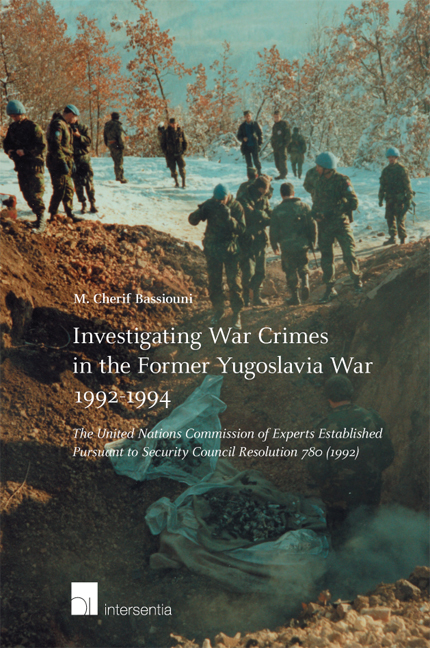 Investigating War Crimes in the Former Yugoslavia War 1992–1994
Investigating War Crimes in the Former Yugoslavia War 1992–1994 Book contents
- Frontmatter
- Contents
- Dedication
- About this Book
- About the Author
- Acknowledgement
- Table of Abbreviations
- Table of Authorities
- Chapter I Background on the Conflict in the Former Yugoslavia
- Chapter II Some Pictorial Descriptions
- Chapter III An Overview of the Realpolitik and the Workings of the Commission of Experts
- Chapter IV Precedents Leading to United Nations Security Council Resolution 780 (1992)
- Chapter V The Commission of Experts’ Establishment and Processes
- Chapter VI Final Report of the Commission of Experts Established Pursuant to Security Council Resolution 780 (1992) and Annex Summaries and Conclusions
- Chapter VII The Absence of a Transition between the Commission of Experts and the ICTY
- Chapter VIII Experiences that Affected Me the Most During My Tenure on the Commission of Experts
- Chapter IX Concluding Reflections
Chapter V - The Commission of Experts’ Establishment and Processes
Published online by Cambridge University Press: 12 October 2018
- Frontmatter
- Contents
- Dedication
- About this Book
- About the Author
- Acknowledgement
- Table of Abbreviations
- Table of Authorities
- Chapter I Background on the Conflict in the Former Yugoslavia
- Chapter II Some Pictorial Descriptions
- Chapter III An Overview of the Realpolitik and the Workings of the Commission of Experts
- Chapter IV Precedents Leading to United Nations Security Council Resolution 780 (1992)
- Chapter V The Commission of Experts’ Establishment and Processes
- Chapter VI Final Report of the Commission of Experts Established Pursuant to Security Council Resolution 780 (1992) and Annex Summaries and Conclusions
- Chapter VII The Absence of a Transition between the Commission of Experts and the ICTY
- Chapter VIII Experiences that Affected Me the Most During My Tenure on the Commission of Experts
- Chapter IX Concluding Reflections
Summary
THE COMMISSION'S ESTABLISHMENT
As previously stated, on October 6, 1992, the Security Council adopted Resolution 780, establishing a Commission of Experts to investigate and collect evidence on “grave breaches of the Geneva Conventions and other violations of international humanitarian law” in the conflict in the former Yugoslavia. Not since the International Military Tribunal at Nuremberg (1945) had the world community taken collective action to provide for an international body to investigate violations of international humanitarian law with a view to prosecuting its perpetrators before an ad hoc international tribunal.
The long hiatus from the development of criminal justice measures between Nuremberg and the establishment of the Commission in 1992 meant that the Commission of Experts did not have much to look to in terms of precedent and needed to establish its own investigatory path in the undertaking of such a broad mandate. The first was the interpretation of the Security Council's mandate and the experts employed to carry out the investigation and documentation.
MANDATE AND COMPOSITION
Security Council Resolution 780 established the Commission of Experts’ mandate as follows, requesting the Secretary-General,
[T]o establish, as a matter of urgency, an impartial Commission of Experts to examine and analyse the information submitted pursuant to resolution 771 (1992) and the present resolution, together with such further information as the Commission of Experts may obtain through its own investigations or efforts, of other persons or bodies pursuant to resolution 771 (1992), with a view to providing the Secretary-General with its conclusions on the evidence of grave breaches of the Geneva Conventions and other violations of international humanitarian law committed in the territory of the former Yugoslavia.
The Commission of Experts interpreted its extraordinarily mandate as requiring the collection of all possibly relevant information and evidence concerning violations of international humanitarian law that it could secure given its resources and capabilities.
Resolution 780 reiterated the Council's previous request in Resolution 771 that governments and organizations submit reports to the Security Council containing information relating to violations of international humanitarian law, including grave breaches of the Geneva Conventions of 1949. The later resolution, however, called upon governments, UN bodies, intergovernmental organizations (IGOs), and nongovernmental organizations (NGOs) to make such information available specifically to the Commission of Experts.
- Type
- Chapter
- Information
- Investigating War Crimes in the Former Yugoslavia War 1992–1994The United Nations Commission of Experts Established Pursuant to Security Council Resolution 780 (1992), pp. 125 - 164Publisher: IntersentiaPrint publication year: 2017


